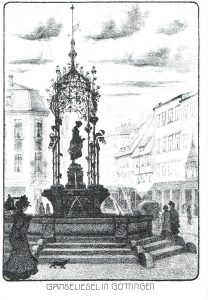“It is important that students bring a certain ragamuffin, barefoot irreverence to their studies; they are not here to worship what is known but to question it.”
(Bronowski, 1973/2011, pp. 341-342)
“… barefoot irreverence to their studies”? “not here to worship what is known”?
Is this true? What does it mean?
 In Chapter 11 of The Ascent of Man— yes, ascent, not descent– Bronowski makes a point about the “irony of history:”
In Chapter 11 of The Ascent of Man— yes, ascent, not descent– Bronowski makes a point about the “irony of history:”
When the future looks back on the 1930s it will think of them as a crucial confrontation of culture as I have been expounding it, the ascent of man, against the throwback to the despots’ belief that they have absolute certainty. (p. 348)
Heisenberg was a graduate of the University of Göttingen, so Bronowski wants to make a point of the culture that eventually shaped the “uncertainty principle.” “The symbol of the University,” he says,
is the iron statue outside the Rathskeller of a barefoot goose girl [the Gänseliesel] that every student kisses at graduation. The University is a Mecca to which students come with something less than perfect faith. (p. 341)
Now comes the famous pronouncement on academic expectations: “It is important that students bring a certain ragamuffin, barefoot irreverence to their studies; they are not here to worship what is known but to question it.”
Is this true?

 Follow
Follow